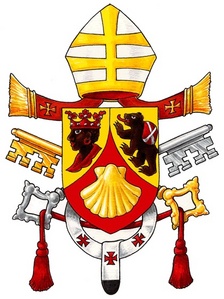
Pope Benedict XVI: December 2010 Archives

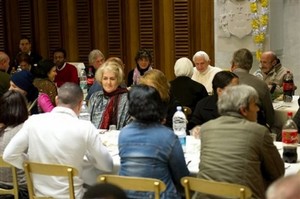
Earlier today the Paul VI Audience Hall was the setting for lunch with 250 of Rome's economically and socially challenged people with Pope Benedict XVI. For him, it was an opportunity to meet Christ in brothers and sisters. The world, of course, is more interested in knowing what the papal guests ate. The newswires report that lasagna, veal and cake were on the menu. The Pope's friends for lunch are people who interface on a daily basis with the Missionaries of Charity, the group of sisters founded by Blessed Mother Teresa of Calcutta. Blessed Teresa's 100th birthday is this year and the Pope wanted to acknowledge the greatness of the woman who focused our attention to those most loved by God and despised by the world.
Dear friends,
I'm very happy to be here today with you, and I extend warm greetings to the Reverend Mother General of the Missionaries of Charity, to the priests, sisters, contemplative brothers and all of you here to enjoy this brotherly moment together.
Verbum caro factum est - The Word became flesh (Jn 1:14).
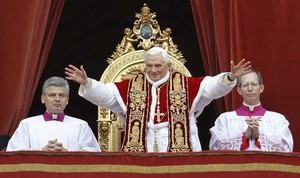 Dear
brothers and sisters listening to me here in Rome and throughout the world, I
joyfully proclaim the message of Christmas: God became man; he came to dwell
among us. God is not distant: he is "Emmanuel", God-with-us. He is no
stranger: he has a face, the face of Jesus.
Dear
brothers and sisters listening to me here in Rome and throughout the world, I
joyfully proclaim the message of Christmas: God became man; he came to dwell
among us. God is not distant: he is "Emmanuel", God-with-us. He is no
stranger: he has a face, the face of Jesus.
This message is ever new, ever surprising, for it surpasses even our most daring hope. First of all, because it is not merely a proclamation: it is an event, a happening, which credible witnesses saw, heard and touched in the person of Jesus of Nazareth! Being in his presence, observing his works and hearing his words, they recognized in Jesus the Messiah; and seeing him risen, after his crucifixion, they were certain that he was true man and true God, the only-begotten Son come from the Father, full of grace and truth (cf. Jn 1:14).
Note of the Congregation for the Doctrine of the Faith
On the trivilization of sexuality regarding
certain interpretations of Light of the World
Following the publication of the interview-book Light of the World by Benedict XVI, a number of erroneous interpretations have emerged which have caused confusion concerning the position of the Catholic Church regarding certain questions of sexual morality. The thought of the Pope has been repeatedly manipulated for ends and interests which are entirely foreign to the meaning of his words - a meaning which is evident to anyone who reads the entire chapters in which human sexuality is treated. The intention of the Holy Father is clear: to rediscover the beauty of the divine gift of human sexuality and, in this way, to avoid the cheapening of sexuality which is common today.
Some interpretations have presented the words of the Pope as a contradiction of the traditional moral teaching of the Church. This hypothesis has been welcomed by some as a positive change and lamented by others as a cause of concern - as if his statements represented a break with the doctrine concerning contraception and with the Church's stance in the fight against AIDS. In reality, the words of the Pope - which specifically concern a gravely disordered type of human behaviour, namely prostitution (cf. Light of the World, pp. 117-119) - do not signify a change in Catholic moral teaching or in the pastoral practice of the Church.
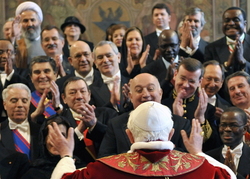 If you are following the daily work of the Pope you'll
notice that his schedule is often filled with meeting important people.
Ambassadors are but one such group of important people that build relationships between the Pope (and
the Holy See) with a respective nation. From my perspective I am interested in the workings of the US Ambassador to the Holy See,
Dr. Miguel Humberto Dias, but I have an interest in what others are doing, too, because of the universality of the Church and needs of humanity.
If you are following the daily work of the Pope you'll
notice that his schedule is often filled with meeting important people.
Ambassadors are but one such group of important people that build relationships between the Pope (and
the Holy See) with a respective nation. From my perspective I am interested in the workings of the US Ambassador to the Holy See,
Dr. Miguel Humberto Dias, but I have an interest in what others are doing, too, because of the universality of the Church and needs of humanity.
20 December 2010
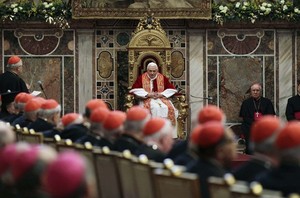
It gives me great pleasure to be here with you, dear Members of the College of Cardinals and Representatives of the Roman Curia and the Governatorato, for this traditional gathering. I extend a cordial greeting to each one of you, beginning with Cardinal Angelo Sodano, whom I thank for his sentiments of devotion and communion and for the warm good wishes that he expressed to me on behalf of all of you. Prope est jam Dominus, venite, adoremus! As one family let us contemplate the mystery of Emmanuel, God-with-us, as the Cardinal Dean has said. I gladly reciprocate his good wishes and I would like to thank all of you most sincerely, including the Papal Representatives all over the world, for the able and generous contribution that each of you makes to the Vicar of Christ and to the Church.
Excita, Domine, potentiam tuam, et veni. Repeatedly during the season of Advent the Church's liturgy prays in these or similar words. They are invocations that were probably formulated as the Roman Empire was in decline. The disintegration of the key principles of law and of the fundamental moral attitudes underpinning them burst open the dams which until that time had protected peaceful coexistence among peoples. The sun was setting over an entire world. Frequent natural disasters further increased this sense of insecurity. There was no power in sight that could put a stop to this decline. All the more insistent, then, was the invocation of the power of God: the plea that he might come and protect his people from all these threats.
 The Pope released his message for the World Day of Peace today which celebrates the XLIV World Day of Peace. It's a New Year message all peoples. The themes of the message are:
The Pope released his message for the World Day of Peace today which celebrates the XLIV World Day of Peace. It's a New Year message all peoples. The themes of the message are:- the nature of religious freedom
- the right to religious freedom
- religious freedom is a duty of public authority
- religious freedom and the search for truth
- religious freedom and identity
- communal dimension of religious freedom
- religious freedom and dialogue
- religious freedom and the state
- religious freedom is motivated by solidarity and not reciprocity
- religious freedom and the missionary charge
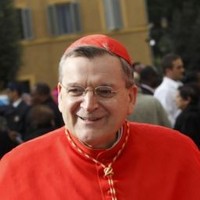
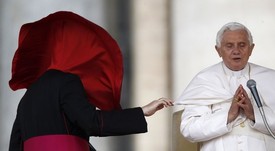 Pope Benedict's invitation to prayer for the month of December, these last days of the calendar year for our unity with him before the Throne of Grace. Ask the Sacred Heart of Jesus to hear and answer our prayers:
Pope Benedict's invitation to prayer for the month of December, these last days of the calendar year for our unity with him before the Throne of Grace. Ask the Sacred Heart of Jesus to hear and answer our prayers:

